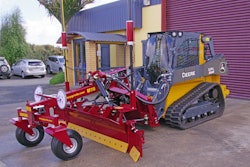
Some choose to believe only the mighty dollar can sway employees’ willingness to stay with a landscaping company but for those wanting to think outside the box should consider changing the nature of the workweek itself.
One scheduling option is known as Summer Fridays. This is the practice of offering employees paid time off on Fridays that land between Memorial Day and Labor Day. Summer Fridays are said to have been introduced in the 1960s when ad agencies in New York City noticed their employees weren’t as productive in the summer, according to Forbes.
While you might think that working longer means your company must be more efficient, studies show that productivity drops when employees work more than 50 hours a week. Laborers at work for a long time may also experience fatigue or stress, reducing their productivity while increasing the chances of errors, accidents and sickness that end up costing the employer more money.
The movement for Summer Fridays has increased over the years and according to a survey by Gartner, 42 percent of companies polled offered Summer Fridays in 2017.
“As the number of employees feeling more confident about their personal job prospects increases, companies must find creative ways to reward and retain their top talent,” says Brian Kropp, HR practice leader at Gartner. “Giving employees the gift of time via Summer Fridays is one low-cost way to improve employee engagement, which in turn can increase employee productivity and drive business results.”
Why offer Summer Fridays?
Because overworking your employees can lead to stress, offering more time off can prevent burnout and give them more of a healthy work-life balance. Providing this extra bit of freedom allows employees to have more time to be with friends and family and makes them happier.
It has been found that when workers have better personal lives, they have increased loyalty and productivity, as they tend to be grateful towards the company that is allowing them to have that level of flexibility.
Morale can also be boosted as taking your crews’ free time into consideration can show that you care about their overall well-being and not just a bottom line. They are more willing to work harder after they have been refreshed over a longer weekend.
Summer Fridays can also serve as a recruiting tactic as not all businesses offer them, and it can show employees you are willing to work with them.
The knowledge that employees are getting Friday off can also encourage them to be more productive during the other four weekdays.
Drawbacks of Summer Fridays
Yet on the flip side of this is Summer Fridays can end up stressing some employees more as they know they will have more to do in fewer days.
Aside from increasing stress levels of some, if your form of Summer Fridays consist of Fridays being some sort of a half day, these can end up being a waste of time as some workers will be already be distracted or the nature of the work is not something that can be started and then stopped in the middle of the day.
Another possible issue is the transition back to a normal workweek in September can cause a dour mood among crew members. It is harder to take something away rather than never offer it in the first place. One expert suggests keeping the three-day weekends to twice a month during the summer, so it isn’t such a major adjustment once fall rolls around.
Types of policies
Some may say Summer Fridays are only a perk that white-collar businesses can enjoy but it all depends on coming up with a policy that suits your business’s needs, employee schedules and staffing needs.
The good thing about Summer Fridays is there is no right way to do it. Each company’s Summer Friday policy can be whatever works for them. Below are just some of the options available.
- Get off work at noon on Fridays until Labor Day
- Get off on Friday afternoons before holiday weekends
- Get a full Friday off every other week
- Get a full Friday off once a month
- Get a full Friday off in exchange for working longer Mondays-Thursdays
One landscaping company restructured its hours for a four-day workweek year-round after realizing its employees did not have a good work/life balance.
Founder of Utopian Landscapes LLC based in Harrisburg, Pennsylvania, Nikos Phelps noticed they were losing employees to other industries and when he viewed the company through his workers’ eyes, he realized he wouldn’t want to work there either.
“When you work sun up to sun down every weekday, you don’t have much time for anything else,” Phelps tells NALP. “We realized we needed to change that.”
In response, his staff now works four 10-hour days a week. The goal is to have Fridays off, but sometimes weather can cause that to be the off day and employees work on Friday.
“We allow them to have flexibility with this schedule and to take ownership of it,” Phelps says. “It’s no fun working in the rain, but if everyone agrees they’d really rather put in the hard work in the rain and be able to have Friday off, then they can do that. Sometimes the team collectively decides they’re going to have a four-day weekend by taking off Friday and Monday and working the remaining days. We like letting them make those decisions as often as possible.”









